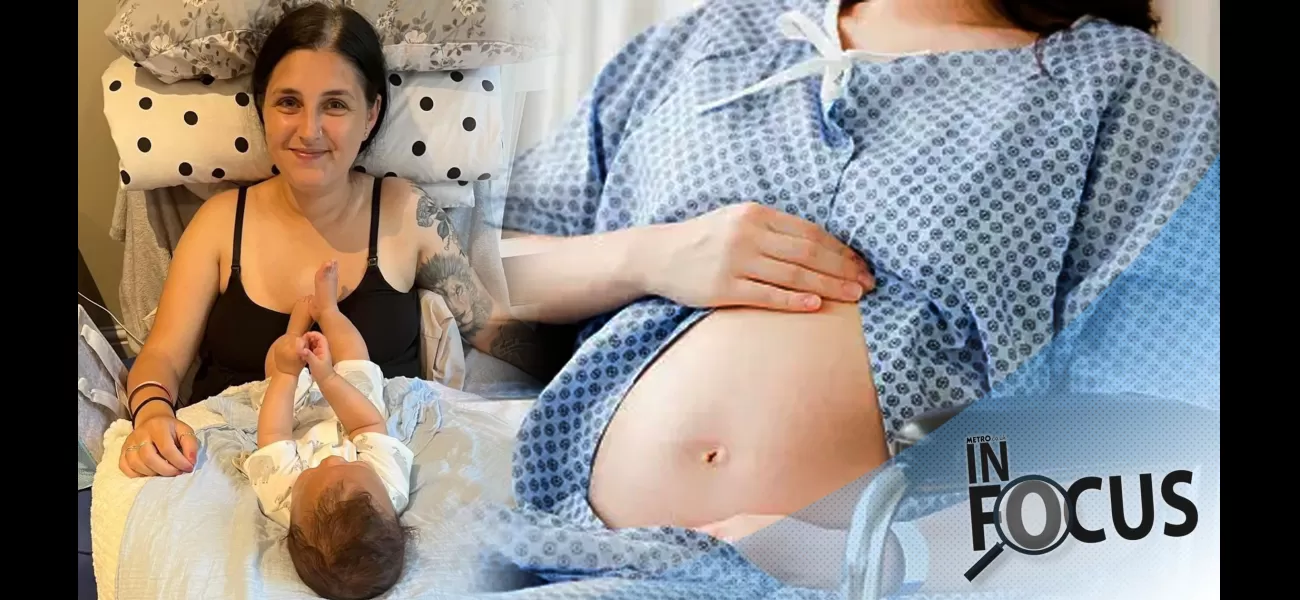Pregnancy caused my back injury and disability, but midwives said it was expected.
Sophie suffered from a rare pregnancy condition that resulted in multiple spinal and hip fractures, as well as a significant decrease in height.
February 3rd 2024.

Sophie's life took a drastic turn when she was diagnosed with a rare condition that left her in constant agony. At 26 years old, she was unable to care for her two young children and had to rely on her mother for help. It all started with what she thought was just normal pelvic girdle pain during her pregnancy. The midwives reassured her that it was nothing to worry about and sent her to a physiotherapist. However, the pain only got worse as time went on.
After giving birth to her second child, Sophie's pain became unbearable. She describes it as a knife going through her hip bone with every step she took. Despite seeking medical help, she was constantly told that the pain was normal and was given ineffective medication. It wasn't until her back gave out while she was holding her baby that she realized something was seriously wrong. Even then, it took hours of trying to get help before she was finally taken to the hospital in an ambulance.
Doctors at the hospital discovered that Sophie had three spinal fractures and had been sitting in the ward with elderly patients who had broken their hips. She was shocked to learn that she had been unknowingly living with fractured bones for months. But even with this diagnosis, she was discharged without a proper treatment plan and was told she would have to wait three months for an appointment with a specialist.
Unable to wait that long, Sophie decided to pay to see a specialist privately. It was then that she was diagnosed with Pregnancy Associated Osteoporosis (PAO), a rare condition that causes bones to break easily during pregnancy or postnatally. She also found out that she had eight spinal fractures, two spinal extrusions, and a hip fracture, causing her to lose 4cm of height. Her bone density was compared to that of a postmenopausal elderly woman.
Sadly, Sophie's experience is not uncommon for women with PAO. Due to the lack of awareness among healthcare professionals, rare conditions like PAO are often missed and dismissed, leading to major consequences for the patient's physical and mental health. Professor Stuart Ralston, a rheumatologist, is leading a research study to better understand PAO and its impact on women's health. The study aims to identify potential risk factors and improve early diagnosis and treatment.
Preliminary findings suggest that early diagnosis and treatment are crucial in preventing permanent damage from PAO. While the current estimate is that PAO affects 49 pregnancies a year in the UK, the actual number is likely higher due to difficulties in getting a proper diagnosis, especially among women from lower socio-economic groups. Sophie's story serves as a reminder of the importance of raising awareness and improving access to healthcare for individuals with rare conditions.
Sophie's life has drastically changed since her condition was finally diagnosed after months of suffering. She spends most of her days sitting in her bright second-floor flat, often in pain, in a blue electric armchair. Her six-year-old son, Noah, has noticed her struggles and often tells her she is "really good at having a broken back." At just 26 years old, Sophie is now registered disabled and relies on her mother, Esther, to help care for her children.
But this was not always the case for Sophie and her family. Initially, midwives dismissed her hip pain as normal for a woman six months pregnant and referred her to a physiotherapist. However, the pain only grew worse and by the time she gave birth to her second child, Henry, in March 2023, she was in constant agony. Sophie describes the pain as "feeling like a knife going through my hip bone" every time she took a step. Despite her concerns, the midwives continued to reassure her that everything was normal.
When her baby was just a month old, the pain became unbearable and Sophie's mother took her to the hospital. After waiting for seven hours, she was finally seen by a doctor who sent her for an X-ray. However, another doctor then refused to give her an X-ray, claiming it was not safe for a woman who had just given birth. Sophie was sent home with a prescription for co-codamol, even though she was breastfeeding and it went against medical guidelines.
Two months later, Sophie's back gave out while she was holding her baby. She managed to get to the sofa but was in excruciating pain. She called for her son, Noah, to help her and then called her mother for assistance. After hours of trying to get medical help, she was finally taken to the hospital in an ambulance. There, doctors discovered that she had three spinal fractures. Sophie was shocked and devastated, thinking she had only sprained her back. However, she soon learned that she also had eight spinal fractures, two extrusions, and a hip fracture. Her bone density was equivalent to that of a postmenopausal elderly woman.
Sophie's experience is unfortunately not uncommon for women with Pregnancy Associated Osteoporosis (PAO). This rare condition causes bones to break easily during pregnancy or postnatally. CEO of UK Charity Medics4RareDiseases, Dr. Lucy McKay, explains that rare conditions like PAO are often missed due to a lack of awareness among healthcare professionals. This can have serious consequences for both physical and mental health, as well as for families and caregivers.
Research is currently being conducted at the University of Edinburgh to better understand PAO and its impact on women. Rheumatologist Professor Stuart Ralston is leading the study, which aims to identify potential risk factors and develop early diagnosis and treatment methods. It is estimated that PAO affects at least 49 pregnancies each year in the UK, but this number may be higher due to the challenges women face in getting a proper diagnosis.
Professor Ralston's research has already revealed that early diagnosis and treatment are crucial in preventing permanent damage from PAO. Sophie's experience serves as a reminder of the importance of awareness and education surrounding rare conditions like PAO.
After giving birth to her second child, Sophie's pain became unbearable. She describes it as a knife going through her hip bone with every step she took. Despite seeking medical help, she was constantly told that the pain was normal and was given ineffective medication. It wasn't until her back gave out while she was holding her baby that she realized something was seriously wrong. Even then, it took hours of trying to get help before she was finally taken to the hospital in an ambulance.
Doctors at the hospital discovered that Sophie had three spinal fractures and had been sitting in the ward with elderly patients who had broken their hips. She was shocked to learn that she had been unknowingly living with fractured bones for months. But even with this diagnosis, she was discharged without a proper treatment plan and was told she would have to wait three months for an appointment with a specialist.
Unable to wait that long, Sophie decided to pay to see a specialist privately. It was then that she was diagnosed with Pregnancy Associated Osteoporosis (PAO), a rare condition that causes bones to break easily during pregnancy or postnatally. She also found out that she had eight spinal fractures, two spinal extrusions, and a hip fracture, causing her to lose 4cm of height. Her bone density was compared to that of a postmenopausal elderly woman.
Sadly, Sophie's experience is not uncommon for women with PAO. Due to the lack of awareness among healthcare professionals, rare conditions like PAO are often missed and dismissed, leading to major consequences for the patient's physical and mental health. Professor Stuart Ralston, a rheumatologist, is leading a research study to better understand PAO and its impact on women's health. The study aims to identify potential risk factors and improve early diagnosis and treatment.
Preliminary findings suggest that early diagnosis and treatment are crucial in preventing permanent damage from PAO. While the current estimate is that PAO affects 49 pregnancies a year in the UK, the actual number is likely higher due to difficulties in getting a proper diagnosis, especially among women from lower socio-economic groups. Sophie's story serves as a reminder of the importance of raising awareness and improving access to healthcare for individuals with rare conditions.
Sophie's life has drastically changed since her condition was finally diagnosed after months of suffering. She spends most of her days sitting in her bright second-floor flat, often in pain, in a blue electric armchair. Her six-year-old son, Noah, has noticed her struggles and often tells her she is "really good at having a broken back." At just 26 years old, Sophie is now registered disabled and relies on her mother, Esther, to help care for her children.
But this was not always the case for Sophie and her family. Initially, midwives dismissed her hip pain as normal for a woman six months pregnant and referred her to a physiotherapist. However, the pain only grew worse and by the time she gave birth to her second child, Henry, in March 2023, she was in constant agony. Sophie describes the pain as "feeling like a knife going through my hip bone" every time she took a step. Despite her concerns, the midwives continued to reassure her that everything was normal.
When her baby was just a month old, the pain became unbearable and Sophie's mother took her to the hospital. After waiting for seven hours, she was finally seen by a doctor who sent her for an X-ray. However, another doctor then refused to give her an X-ray, claiming it was not safe for a woman who had just given birth. Sophie was sent home with a prescription for co-codamol, even though she was breastfeeding and it went against medical guidelines.
Two months later, Sophie's back gave out while she was holding her baby. She managed to get to the sofa but was in excruciating pain. She called for her son, Noah, to help her and then called her mother for assistance. After hours of trying to get medical help, she was finally taken to the hospital in an ambulance. There, doctors discovered that she had three spinal fractures. Sophie was shocked and devastated, thinking she had only sprained her back. However, she soon learned that she also had eight spinal fractures, two extrusions, and a hip fracture. Her bone density was equivalent to that of a postmenopausal elderly woman.
Sophie's experience is unfortunately not uncommon for women with Pregnancy Associated Osteoporosis (PAO). This rare condition causes bones to break easily during pregnancy or postnatally. CEO of UK Charity Medics4RareDiseases, Dr. Lucy McKay, explains that rare conditions like PAO are often missed due to a lack of awareness among healthcare professionals. This can have serious consequences for both physical and mental health, as well as for families and caregivers.
Research is currently being conducted at the University of Edinburgh to better understand PAO and its impact on women. Rheumatologist Professor Stuart Ralston is leading the study, which aims to identify potential risk factors and develop early diagnosis and treatment methods. It is estimated that PAO affects at least 49 pregnancies each year in the UK, but this number may be higher due to the challenges women face in getting a proper diagnosis.
Professor Ralston's research has already revealed that early diagnosis and treatment are crucial in preventing permanent damage from PAO. Sophie's experience serves as a reminder of the importance of awareness and education surrounding rare conditions like PAO.
[This article has been trending online recently and has been generated with AI. Your feed is customized.]
[Generative AI is experimental.]
0
0
Submit Comment





